Medicaid Expansion Would Crush Hospitals in the Remaining Non-Expansion States, Costing Them Billions
Key Findings
- Medicaid expansion has failed to fulfill its advocates’ promises. Instead of protecting the truly needy, Medicaid expansion has kicked millions off private insurance and created massive shortfalls for hospitals.
- Because it pushes out private insurers who pay more, Medicaid expansion leaves hospitals and other medical providers in the red.
- Hospitals in non-expansion states would lose nearly $5.3 billion in revenue from the exchange crowd-out alone if they were to expand Medicaid.
Overview
The Medicaid program has undergone a dramatic transformation. In less than two decades, enrollment has more than doubled from 46 million in 2005 to a record-high 100 million in 2023.1 While the program was once a safety net for the truly needy, millions of able-bodied adults are now enrolled in Medicaid.2 Nearly one in three Americans were on the program in 2023.3
Through ObamaCare, states have the option to expand Medicaid to a new class of able-bodied adults.4 This is driving the enrollment explosion.5 While the Left claims that the newly eligible individuals lack coverage, in reality, able-bodied Americans are being kicked off private insurance and forced onto Medicaid.6 Medicaid expansion prioritizes able-bodied adults at the expense of the truly needy.
Medicaid expansion has failed to fulfill its advocates’ promises. Instead of protecting the truly needy, Medicaid expansion has kicked millions off private insurance and created massive shortfalls for hospitals.
Medicaid expansion needs a reality check. Advocates of expansion dramatically underestimated enrollment, as officials in expansion states claimed that fewer than seven million able-bodied adults would enroll through expansion.7 A leftist think tank projected roughly nine million, while actual enrollment was at least 19 million across expansion states.8
Expansion advocates were also dead wrong on the cost to states. Advocates produced inaccurate cost estimates based on their flawed enrollment projections. So, it is no surprise that Medicaid expansion has cost more than double what was projected.9 In the end, Medicaid expansion siphons resources away from the truly needy to those with existing private coverage.

Forty states and the District of Columbia have taken the bait of Medicaid expansion.10 And the experiences of expansion states show how Medicaid expansion plays out: Actual enrollment and costs greatly exceed projections.
The “crowd-out” busts state budgets and harms medical providers like hospitals by kicking people off their private plans on the exchange and onto Medicaid, which pays providers less. If the remaining 10 states were to expand, millions will be kicked off private insurance and forced onto Medicaid.
In total, roughly 3.6 million able-bodied individuals would be shifted from private insurance to Medicaid if the remaining 10 states were to expand.11 Total expansion enrollment would be even higher.12
These individuals have incomes that meet Medicaid expansion eligibility thresholds but are currently enrolled in private plans in non-expansion states. Taxpayers would foot the bill for these able-bodied adults as Medicaid expansion would force them out of private coverage and onto welfare.
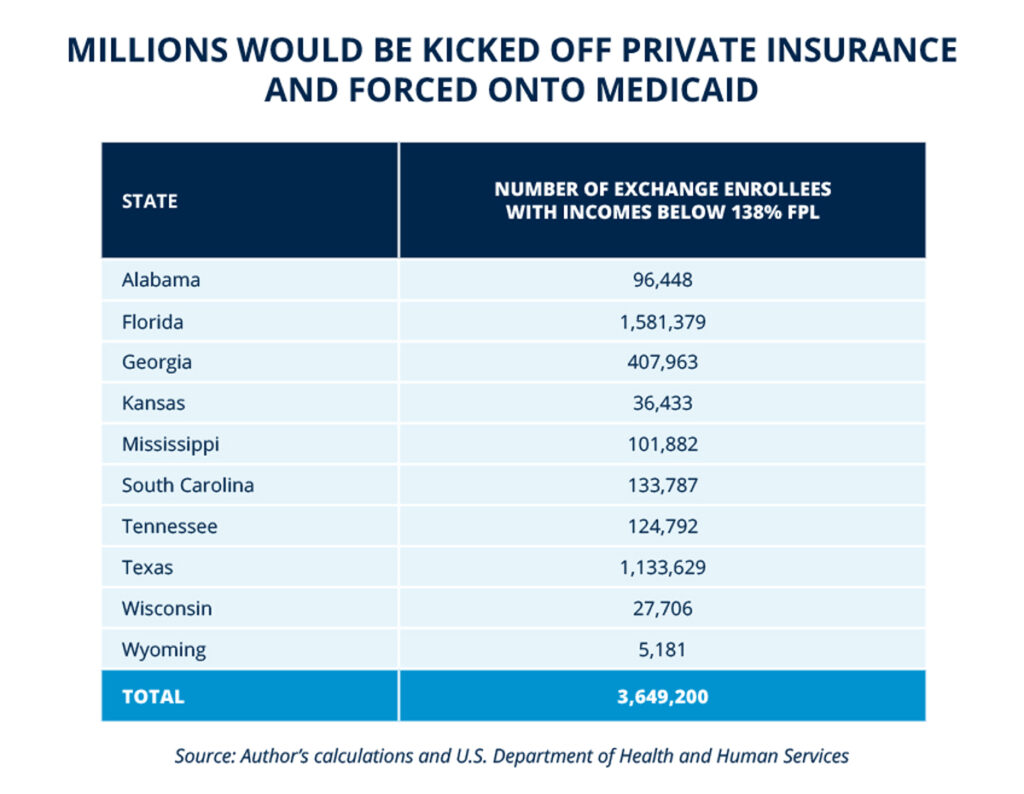
Federal law states that if someone is eligible for Medicaid, they cannot qualify for federal premium subsidies on the exchange.13 The 3.6 million able-bodied adults in non-expansion states that would qualify for Medicaid expansion would lose access to these subsidies if their states were to expand.
Hospitals in expansion states have experienced major shortfalls as individuals are kicked off private insurance and pushed onto welfare. Indeed, Medicaid shortfalls at hospitals in expansion states increased by $12 billion since expansion, a 117 percent increase.14 Moreover, 40 percent of expansion states lost hospital jobs in the first year of Medicaid expansion.15 Should the remaining states expand, they will experience the same destructive fallout.
Because it pushes out private insurers who pay more, Medicaid expansion leaves hospitals and other medical providers in the red.
On average, Medicaid reimburses providers at roughly 60 percent of what private insurance reimburses.16 Medicaid does not pay enough to cover hospital costs, meaning hospitals need to make up for this shortfall by charging private insurers more. But private insurers are being pushed out and with the explosion of enrollment from Medicaid expansion, hospitals are on an unsustainable track. Hospitals have been forced to close in expansion states, despite expansion proponents’ assurances of the opposite.17
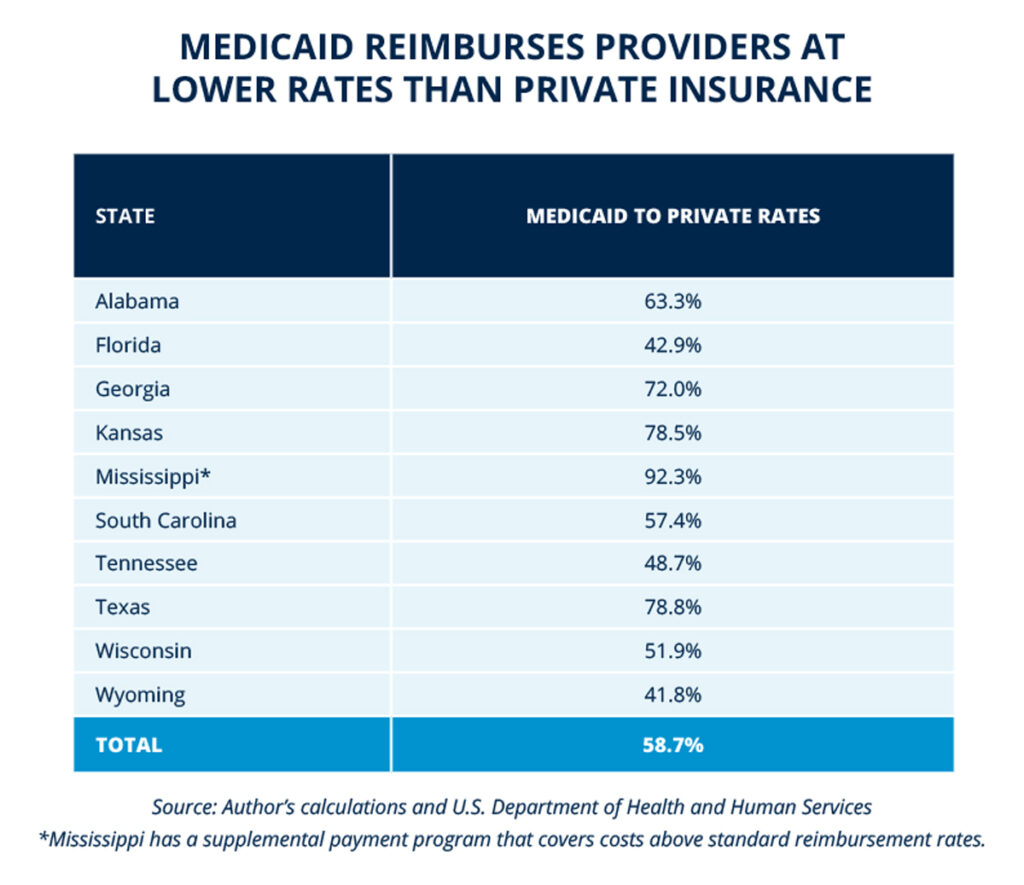
Hospitals’ Medicaid shortfalls would only continue to grow should the remaining states choose to expand.
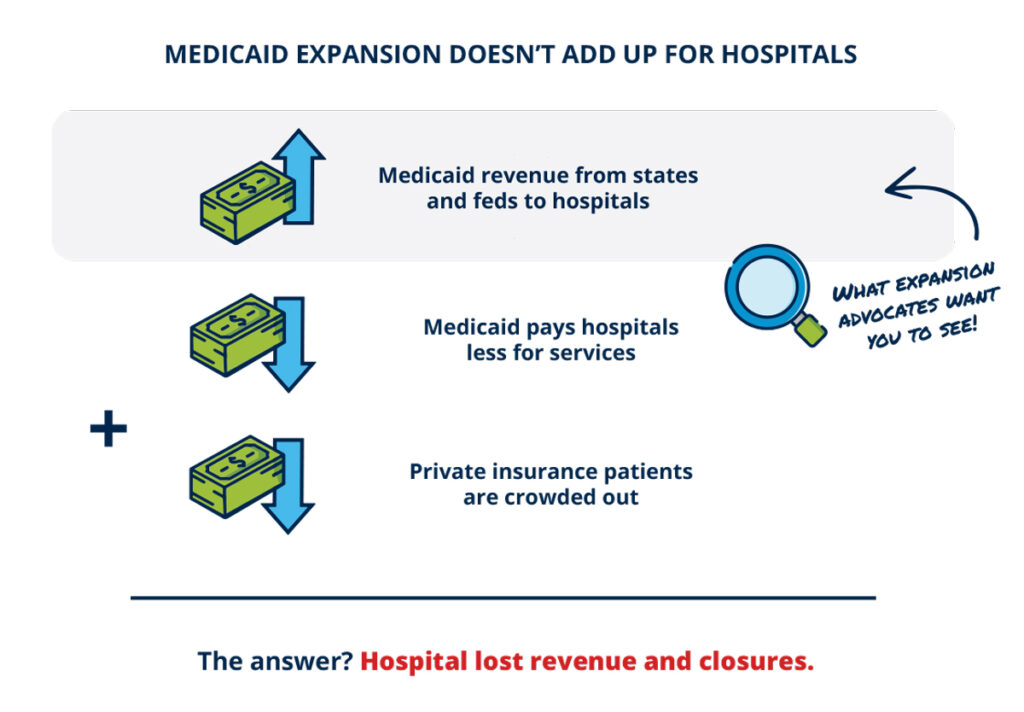
By acknowledging just one part of the equation, Medicaid expansion advocates peddle a disingenuous policy. Forcing individuals from private plans to Medicaid will cause losses for hospitals. Non-expansion states must face the truth: Medicaid expansion is a bad deal.
Hospitals in non-expansion states would lose nearly $5.3 billion in revenue from the exchange crowd-out alone if they were to expand Medicaid.
The experience of expansion states foreshadows what could happen in non-expansion states. Hospitals in expansion states saw their profits slashed by two-thirds from 2013—before expansion—to 2021.18 Hospitals in non-expansion states, on the other hand, have seen their profits more than double over the same period.19
Though Medicaid revenue increased because of the influx of able-bodied adults, because of the reduced payments provided by Medicaid, hospital shortfalls have surged.20 Hospitals must stay open to serve their communities. And hospitals are closing in expansion states.21
With Medicaid expansion, hospitals stand to lose billions. Hospitals in non-expansion states would lose nearly $5.3 billion in revenue just from individuals crowded out of the exchange.22 That amount only includes those pushed out of private insurance from the exchange. Including individuals moving to Medicaid from employer-sponsored insurance, for example, would deal an even bigger blow to hospitals’ bottom line.
Medical providers of all kinds will feel the same negative effects. Doctors, pharmacists, clinics, and other medical providers would lose revenue. In its 2011 actuarial report, the Department of Health and Human Services admits that provider rate restrictions are a key cost-containment strategy for states.23 The crowd-out would harm medical providers in non-expansion states.24-25
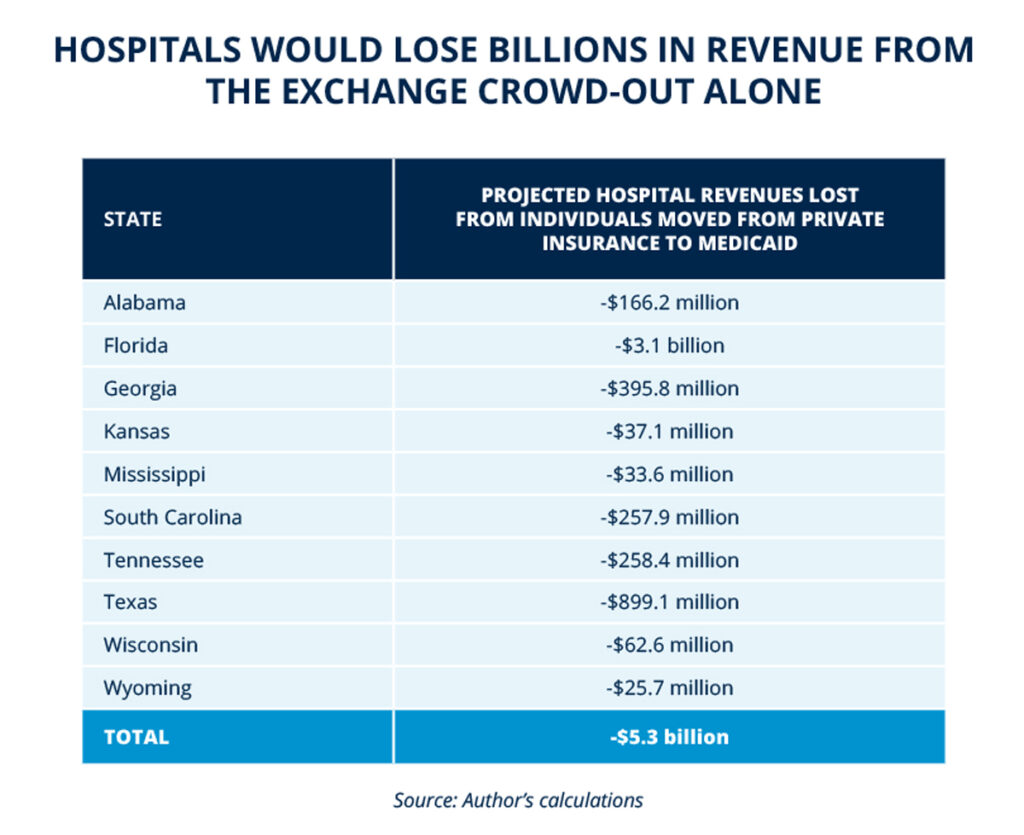
Non-expansion states must stand strong against expansion. As for expansion states, it is not too late to roll back expansion.26
THE BOTTOM LINE: Medicaid expansion is hurting hospitals. Non-expansion states must continue to reject the false promises of expansion.
Medicaid expansion prioritizes a new class of able-bodied adults at the expense of the truly needy. By forcing individuals off private insurance and onto welfare, medical providers are faced with massive shortfalls.

The Left focuses on the new Medicaid revenue to hospitals with the influx of able-bodied adults, but what they fail to acknowledge is that the costs far exceed new revenue. Hospitals and other medical providers stand to lose billions if the remaining states take the bait of Medicaid expansion. Non-expansion states must continue to reject the false promises of Medicaid expansion, and those that have expanded should work to roll it back.
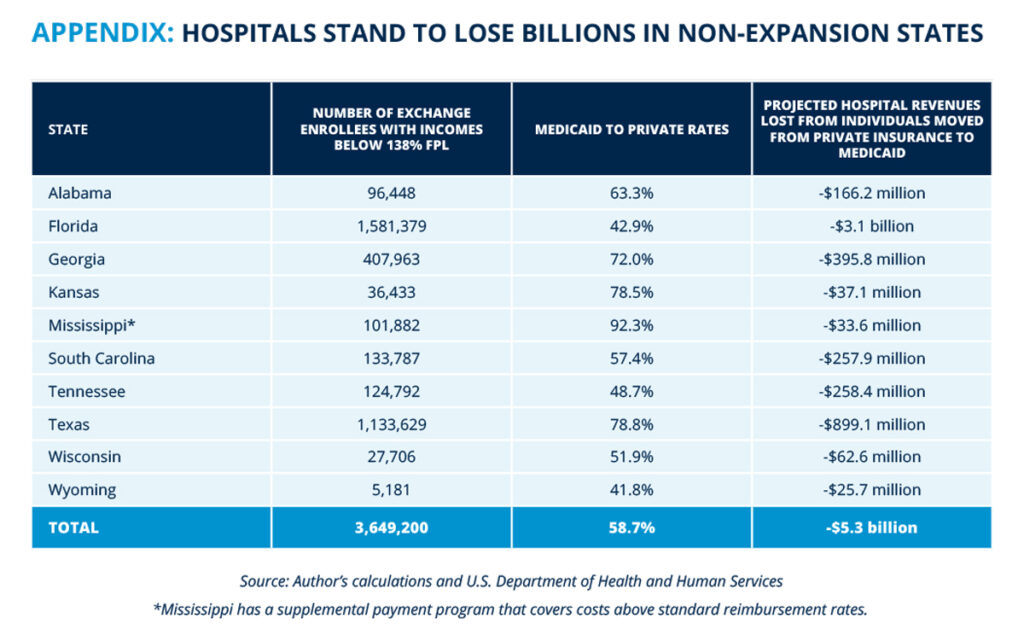
REFERENCES
- Jonathan Bain, “Busted budgets and skyrocketing enrollment: Why states should reject the false promises of Medicaid expansion,” Foundation for Government Accountability (2023), https://thefga.org/research/states-should-reject-false-promises-of-medicaid-expansion.
- Michael Greibrok, “How Congress and states can rein in Biden bureaucrats while protecting taxpayers’ money and Medicaid program integrity,” Foundation for Government Accountability (2023), https://thefga.org/research/how.congress-states-can-rein-biden-bureaucrats.
- Ibid.
- Jonathan Bain, “West Virginia’s Medicaid meltdown: How Medicaid expansion has ravaged the Mountain State,” Foundation for Government Accountability (2024), https://thefga.org/research/west-virginias-medicaid-meltdown.
- Hayden Dublois and Jonathan Ingram, “An unsustainable path: How ObamaCare’s Medicaid expansion is causing an enrollment and budget crisis,” Foundation for Government Accountability (2022), https://thefga.org/research/how-obamacares-medicaid-expansion-is-causing-crisis.
- Jonathan Bain, “How millions of Americans will be kicked off private insurance if the remaining states expand Medicaid,” Foundation for Government Accountability (2024), https://thefga.org/research/how-millions-americans-kicked-off-private-insurance.
- Jonathan Bain, “Busted budgets and skyrocketing enrollment: Why states should reject the false promises of Medicaid expansion,” Foundation for Government Accountability (2023), https://thefga.org/research/states-should-reject-false-promises-of-medicaid-expansion.
- Ibid.
- Ibid.
- KFF, “Status of state Medicaid expansion decisions: interactive map,” KFF (2024), https://www.kff.org/affordable-care-act/issue-brief/status-of-state-medicaid-expansion-decisions-interactive-map/#:~:text=Coverage%20under%20the%20Medicaid%20expansion,%2C%20Virginia%20(1%2F1%2F.
- Jonathan Bain, “How millions of Americans will be kicked off private insurance if the remaining states expand Medicaid,” Foundation for Government Accountability (2024), https://thefga.org/research/how-millions-americans-kicked-off-private-insurance.
- Jonathan Bain, “Busted budgets and skyrocketing enrollment: Why states should reject the false promises of Medicaid expansion,” Foundation for Government Accountability (2023), https://thefga.org/research/states-should-reject-false-promises-of-medicaid-expansion.
- 26 C.F.R. § 1.36B-2 (2018), https://www.govinfo.gov/app/details/CFR-2013-title26-vol1/CFR-2013-title26-vol1-sec1-36B-2.
- Michael Greibrok, “Medicaid expansion dramatically increases hospital shortfalls …and puts their futures at risk,” Foundation for Government Accountability (2024), https://thefga.org/research/medicaid-expansion-dramatically-increases-hospital-shortfalls.
- Jordan Roberts and Nicholas Horton, “Five key signs ObamaCare expansion is not a silver bullet for hospitals,” Foundation for Government Accountability (2020), https://thefga.org/wp-content/uploads/2020/02/ObamaCare-Expansion-Not-A-Silver-Bullet.pdf.
- Hayden Dublois, “Medicaid expansion is closing hospitals,” Foundation for Government Accountability (2023), https://thefga.org/research/medicaid-expansion-is-closing-hospitals.
- Ibid.
- Michael Greibrok, “Medicaid expansion dramatically increases hospital shortfalls …and puts their futures at risk,” Foundation for Government Accountability (2024), https://thefga.org/research/medicaid-expansion-dramatically-increases-hospital-shortfalls.
- Ibid.
- Ibid.
- Hayden Dublois, “Medicaid expansion is closing hospitals,” Foundation for Government Accountability (2023), https://thefga.org/research/medicaid-expansion-is-closing-hospitals.
- Author’s calculations based on U.S. Department of Health and Human Services data.
- Office of the Actuary, “2011 Actuarial Report,” U.S. Department of Health & Human Services (2011), https://www.cms.gov/research-statistics-data-and-systems/research/actuarialstudies/downloads/medicaidreport2011.pdf.
- Paige Haeffele, “Physicians are dropping Medicare patients. Here’s why,” Becker‘s ASC Review (2023), https://www.beckersasc.com/asc-news/physicians-are-dropping-medicare-patients-heres-why.html.
- Christine Sexton, “Pharmacists say they take hit In Medicaid,” Health News Florida (2020), https://health.wusf.usf.edu/health-news-florida/2020-01-31/pharmacists-say-they-take-hit-in-medicaid.
- Idaho State Legislature, House Bill 419, (2024), https://legislature.idaho.gov/sessioninfo/2024/legislation/H0419/.
